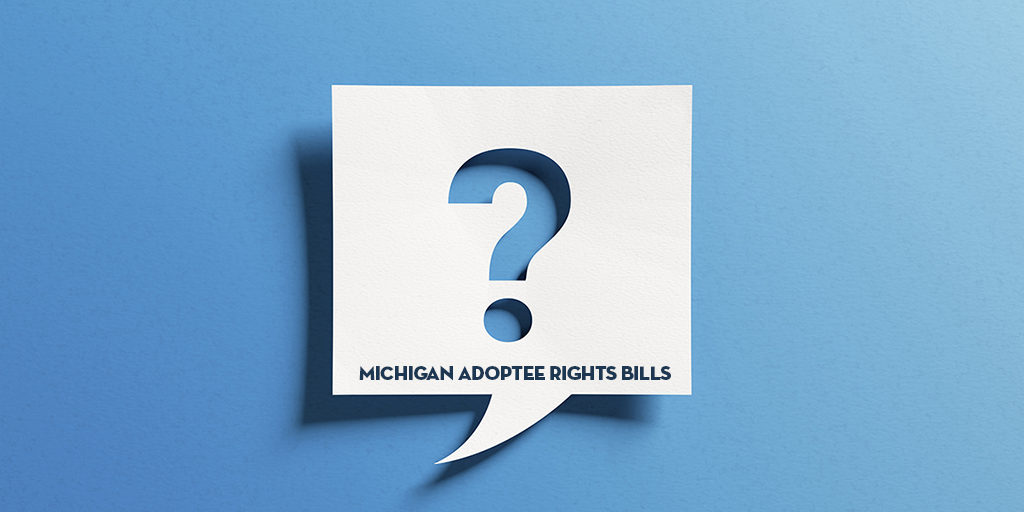Michigan legislators have introduced two bills that, if enacted, would restore the right of all Michigan-born adopted people to request and obtain their own original birth certificates (OBC), without discriminatory restrictions or conditions. Here’s what to know about those bills.
What are the bills and bill numbers?
There are two bills. HB5148 relates to vital records and, if enacted, will be known as “Deborah’s Law,” named after Rep. Kristian Grant’s mother, who is a Michigan-born adoptee.
HB5149 relates to the Michigan probate code, which deals with adoption law, courts, and the Central Adoption Registry.
What do these bills do?
Basically, the bills do two things:
- HB5148 amends Michigan vital records law so that all adult adopted persons and their descendants may request and obtain a copy of the adopted person’s original birth record. No restrictions control the request other than 1) the requestor must be an adult who is at least 18 years of age; 2) the requestor must be an adoptee or the descendant or personal representative of an adoptee; and 3) the proper vital records fee is paid. While the bill also creates a contact preference form available for birthparents to file, it is an optional form that does not control or affect the release of adopted person’s birth record.
- HB5149 eliminates court and Central Adoption Registry control over the release of an adopted person’s own vital record. In doing so it also eliminates Michigan’s notorious “donut hole” restriction that differentiates the rights of adopted people based on the date the court terminated their birthparent’s rights. While the bill retains birthparent denial requests for release of identifying information (not birth records), those denials cannot be filed after July 1, 2024. Further any denials already on file do “not restrict an individual from obtaining an unredacted copy of an original certificate of live birth . . . .”
Is this a bi-partisan effort?
Yes. Each bill has either a Democrat (Rep. Kristian Grant) or a Republican (Rep. Pat Outman) as primary sponsors.
These are “tie-bar” bills. What is a “tie-bar” bill?
Michigan allows introduction of two “tie-bar” bills. Tie-bar bills are connected and neither bill will be enacted if only one bill passes the legislature. The bills are “tied” together. For example, the bill language for HB5148 specifically states “This amendatory act does not take effect unless . . . House Bill No. 5149 (request no. 03439’23) of the 102nd Legislature is enacted into law.”
I heard that vital records may have trouble matching the amended birth record to the original birth record. Does this bill address that issue?
Yes. When vital records encounters an issue in matching the amended record information with the original birth record information, the department can request information from the courts to secure that match. The courts must respond to that request within 14 days. The relevant provision in HB5149 states:
Within 14 days after a request from the department of health and human services, the court that entered the order of adoption must provide the information necessary for the department of health and human services to locate and identify the original certificate of live birth of the adopted individual.
What is the contact preference form in the bill? and how does that affect the release of the original birth certificate?
A genuine contact preference form allows a birthparent listed on the original birth record to express a preference for any contact with the adopted person or the adopted person’s descendants. The forms typically have three choices, and none of the choices will impact the release of the original birth record. Those three choices in the bill include a wish for no contact, for direct contact, or contact through an intermediary.
Does the contact preference form affect the release of the original birth certificate?
No. The contact preference form does not affect the release of the OBC. It is considered advisory only and simply allows a birthparent to express a preference for contact. A completed and filed contact preference form does not prevent the release of the adopted person’s OBC in any way.
Will any information on the original birth record be changed or removed?
No. The bills do not allow for changing or removing (redacting) information on the original birth record.
Who else can apply for the OBC other than the adopted person?
A descendant or legal representative of the adopted person may also apply for a copy of the adopted person’s original birth record.
What are the next steps for these bills?
The bills passed the House 99-8 in November 2023 and are now in the senate, where they were heard by the Senate Committee on Civil Rights, Judiciary, and Public Safety. The committee has not yet voted on whether to report the bill out for consideration by the full senate.
Who is in the Michigan Adoptee Rights Coalition?
The three core partners of MARC are Adoptee Advocates of Michigan; Michigan Adoptee Collaborative; and the Adoptee Rights Law Center. You can read more about each one here.
Where can I read the text of the bills?
You can find the bills listed on the Michigan legislature bill page:
We also have a more thorough overview of each bill here.
Will you be updating this FAQ when necessary?
Of course. This FAQ will be updated as things develop or change. It was last updated on March 2, 2024.

